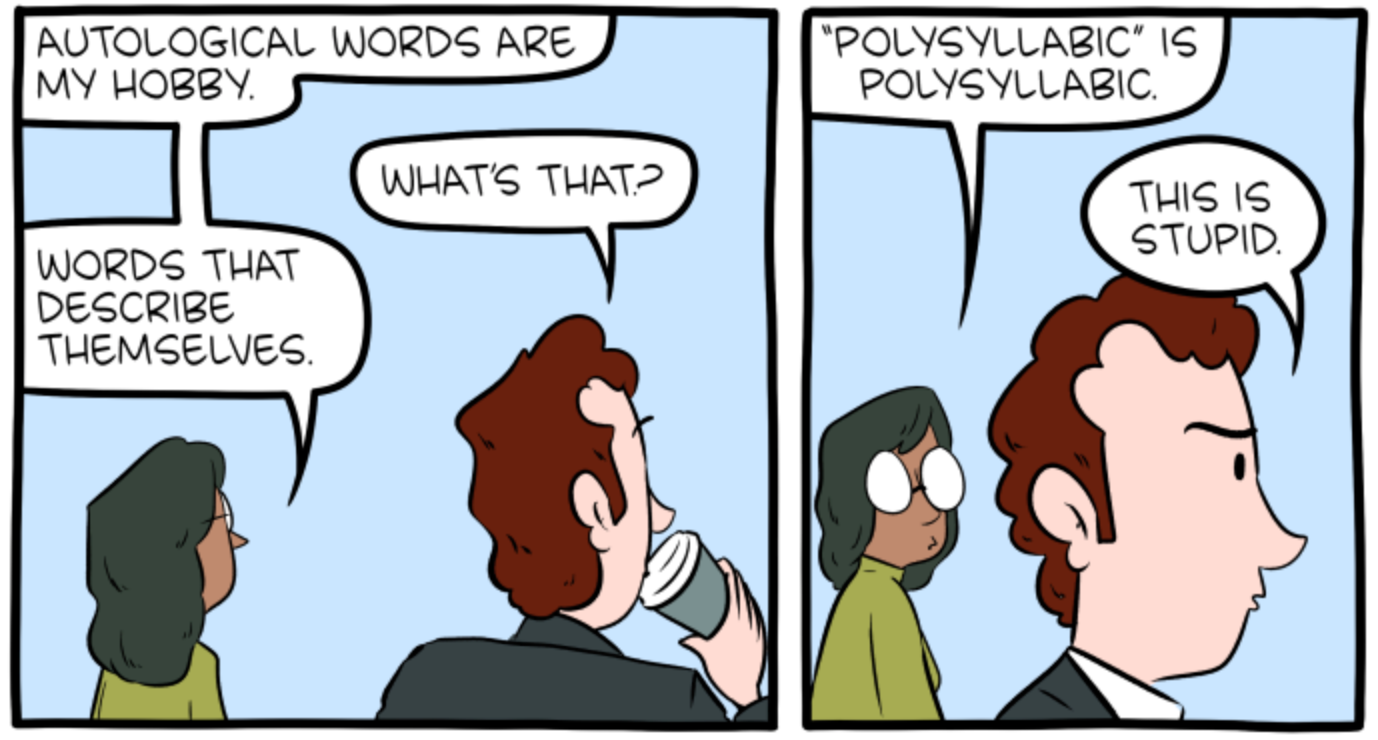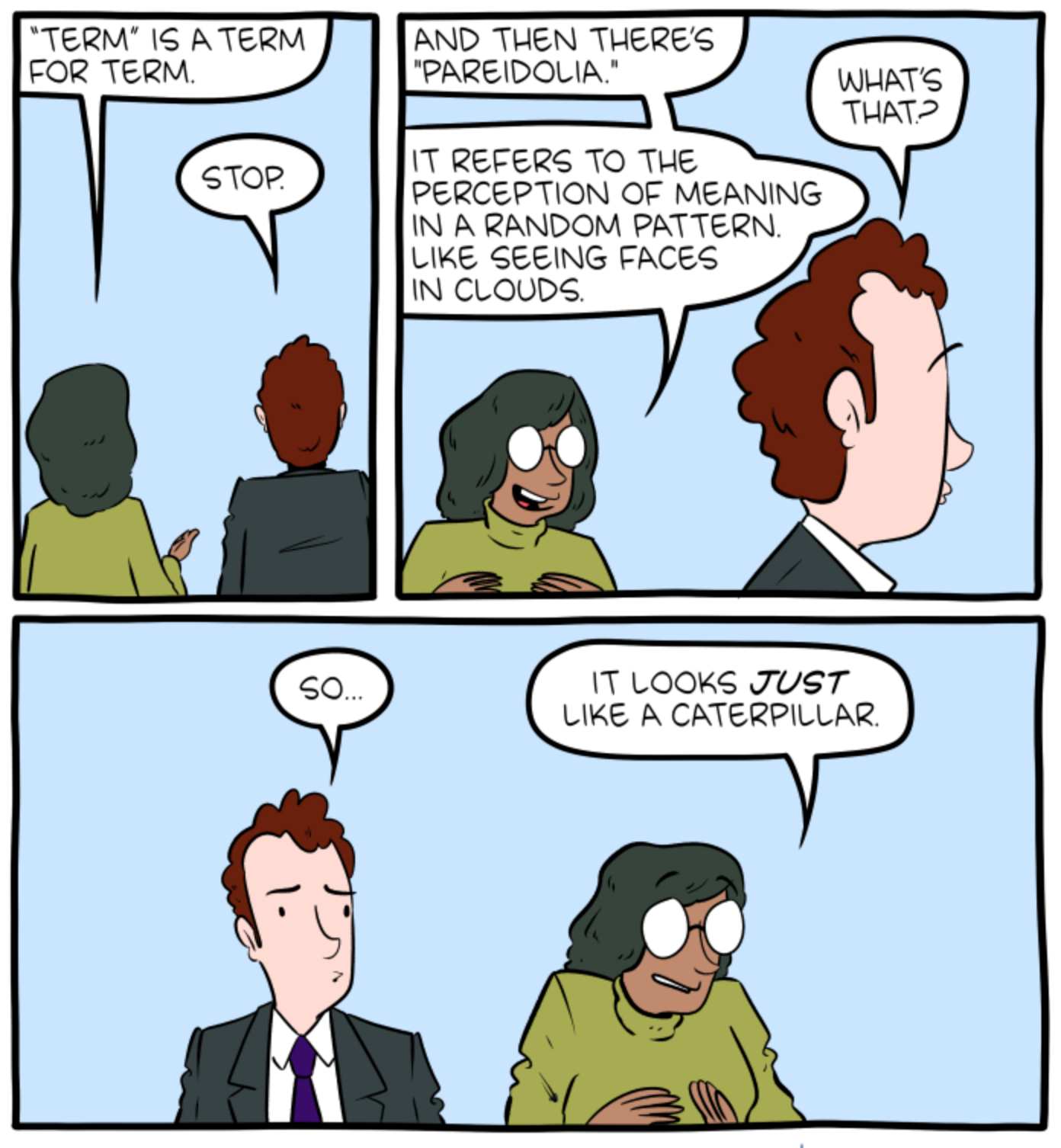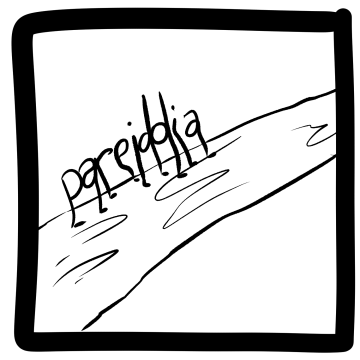Autological Words
« previous post | next post »
The first two panels of today's SMBC:

The rest of it:

The mouseover text: "This comic is actually just a random sequence of pixels."
And the aftercomic:

In the context of Geoff Nunberg's recent passing, this sets up a chain of associations that leads to cellar door, which many have called the most beautiful phrase in English, at least phonaesthetically, despite its pedestrian if not downright ugly referent. Wikipedia's article on phonaesthetics cites two of Geoff's LLOG posts, "The Romantic Side of Familiar Words" (2/26/2010) and "'Slide down my cellar door'" (3/16/2014).
Autological words, which "describe themselves", are somewhat like onomatopoetic words, which sound like themselves, or at least imitate a sound associated with their referent. "Cellar door" is sort of anti-onomatopoetic, since its alleged phonaesthetic beauty is far away from any obvious associations with its aesthetically-lacking referent. And there are no doubt many anti-autological words, e.g. big or minuscule.
Ralph Hickok said,
August 13, 2020 @ 7:06 am
My favorite is "mellifluous."
David Scrimshaw said,
August 13, 2020 @ 7:45 am
Comic Barry Crimmins: Funny thing about the word "esoteric". Not many people know what it means.
J.W. Brewer said,
August 13, 2020 @ 8:14 am
"Pentasyllabic" is a more high-achieving example.
Francois Lang said,
August 13, 2020 @ 8:47 am
"cellar door, which many have called the most beautiful phrase in English,"
I've long thought that "poubelle" (trash can) is the most beautiful word in French.
Paul Clarke said,
August 13, 2020 @ 8:49 am
Is autological autological? And what about unautological?
Gregory Kusnick said,
August 13, 2020 @ 9:12 am
The comic fails to address the thorny question of whether the word "heterological" is autological.
Ambarish Sridharanarayanan said,
August 13, 2020 @ 9:15 am
One of my favourite paradoxes is whether "anti-autological" is an anti-autological word.
If it is anti-autological, by definition of autology it describes itself and is autological, which is a contradiction to its supposed anti-autologicalness.
If it is not anti-autological, it must be autological, which by definition of autology would mean it describes itself and is therefore anti-autological, which is again a contradiction to its supposed not being anti-autological.
J.W. Brewer said,
August 13, 2020 @ 10:08 am
Someone out there on the internet has come up with a bunch that will make sense only to phonetics/phonology enthusiasts, like "sibilant-initial" and "lateral-final."
Separately, it's interesting to note that some of the traditional names for poetic "feet" are autological (e.g. "trochee") but plenty of others aren't (e.g. "dactyl"). I think tend to say "anapest" (on the rather rare occasions I have cause to utter it) as an anapest, but apparently this is a solecism and the conventional stress pattern is dactylic.
arthur said,
August 13, 2020 @ 10:12 am
"awkwardfulness" "sesquipedalian" "trochee" "noun" "intangible" "cromulent"
Frans said,
August 13, 2020 @ 10:37 am
@J.W. Brewer
A dactylus/daktylos is indeed a dactyl; the only problem is it's missing something in English. ;-)
David Marjanović said,
August 13, 2020 @ 12:39 pm
Like the dactyl, it works in German :-)
Tom Dawkes said,
August 13, 2020 @ 3:06 pm
The Spanish words 'llano' (paroxytone: stress on the penultimate syllable) and 'esdrújulo' (proparoxytone: stress on the antepenultimate syllable) are autological, whereas 'agudo' (oxytone: stress on the final syllable) is not. Conversely, of the cognate Catalan terms only 'agut' (='agudo') is autological, whereas 'pla' and 'esdrúixol' are not.
AntC said,
August 13, 2020 @ 6:34 pm
We're within inches of Russell's paradox (he called it an antimony): what's the opposite of autological? That is, a word that doesn't describe itself. Anti-autological? Unautological? Is anti-autological unautological?
Gregory Kusnick said,
August 13, 2020 @ 8:36 pm
AntC: The word in the mathematical literature, going back to circa 1929, seems to be "heterological".
Russinoff said,
August 13, 2020 @ 10:38 pm
For many years I have thought that the word "heterological" and the associated paradox were both due to W.V.O. Quine, who presented them (without attribution, as I recall) in "The Ways of Paradox" (1966?). According to Wikipedia, however, they appear in a 1908 essay of K. Grelling and L. Nelson. The essay was written in German, but the Wikipedia article doesn't identify the original German formulation of the word.
Thomas Rees said,
August 14, 2020 @ 4:11 am
AntC: Did autocorrect produce “antimony” (Sb)?
Russinoff: German Wikipedia has “heterologisch”.
JPL said,
August 14, 2020 @ 4:22 am
The paradox identified by Ambarish Sridharanarayanan and AntC above is known as Grelling's paradox, and it is indeed very similar to Russell's paradox, as they have a similar underlying logical structure, and similar also to the Liar paradox. They all involve the relation of self-reference (which I prefer to call "reflexive reference"), negation and a dichotomized universal domain with what I call an "in/out" structure, where any object either belongs or does not belong to the in or to the out part of the structure; and a focused linguistic object as the paradoxical object that is either "in" or "out". The Liar involves reflexive reference, with a sentence that has the form "s says of itself", while Russell's and Grelling's involve a word or set (which I'll take as having a "set- member of set" structure, so a more specific term for the relation would be "reflexive inclusion"): a category or set that supposedly has the form "s includes itself". The expression and understanding of a reflexive relation (e.g., "Sam shaved himself" (BTW remember the town barber who shaves all and only those who do not shave themselves.)) requires a "two-into-one" relation such that the expressions e and "x-self" are referentially identical, i.e., two expressions, one object of reference. These paradoxes are not really about truth or set theories, but about the logical requirements of linguistic expression and meaning. Explanation of how these paradoxes produce the effects they do is possible and interesting, but a bit too much for this space.
Thomas Hugues said,
August 14, 2020 @ 7:18 am
esoteric – intended for or understood by only a few people who have special knowledge.
AntC said,
August 14, 2020 @ 4:53 pm
@Thomas hahah I suspect more likely a braino. But true that my spellcheck doesn't like 'antinomy' — and suggests the white metal instead.
Andrew Usher said,
August 14, 2020 @ 7:40 pm
Yes, it's Russell's paradox again. Any predicate that is self-referential can be used to construct an example, so there's nothing special about 'autological'.
And yes, regrettably, 'anapest' in English is a dactyl, but the stress shifts in 'anapestic', making possible the known autological _line_
"Anapestic tetrameter makes the verse trot."
k_over_hbarc at yahoo.com